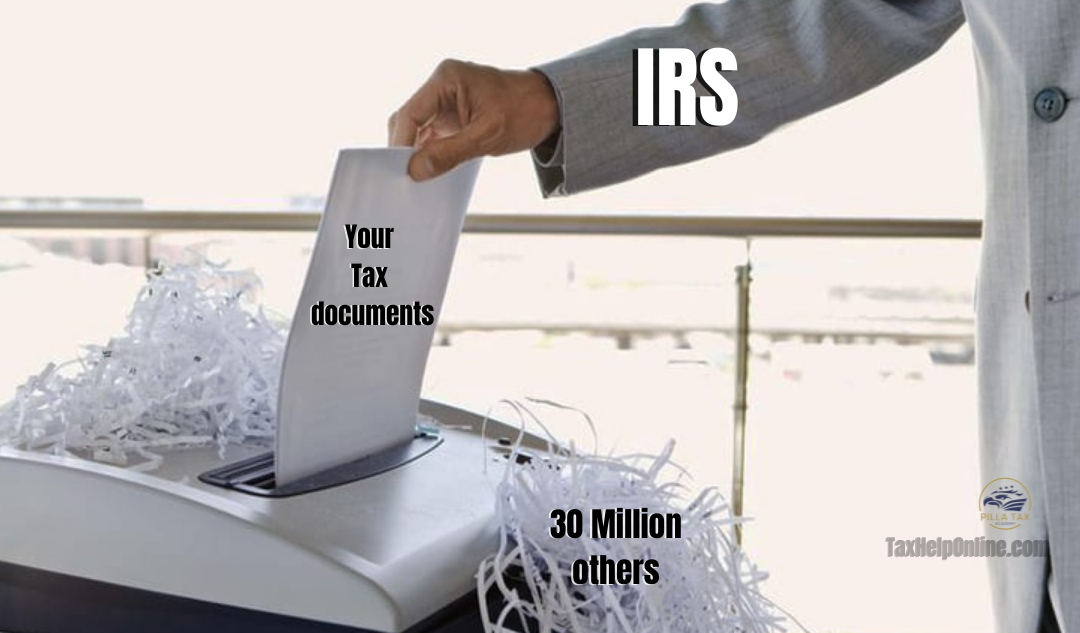SURVIVING THE “GREAT SHRED” OF 2022
How to Keep From Being Victimized by IRS Housecleaning
The lead article in last month’s Pilla Talks Taxes reported that the IRS destroyed 30 million tax documents. That article was also published by National Review and resulted in a number of inquiries from citizens concerned about potential problems growing from shredded documents. People are worried that their tax returns or other submissions to the IRS might have been shredded. Because of these questions, additional clarification is in order.
What the IRS Didn’t Shred
It is clear from the report of the Treasury Inspector General for Tax Administration (TIGTA) what the IRS did, and did not, shred. See, TIGTA Report No. 2022-40-036 (May 4, 2022) (www.treasury.gov/tigta).
The agency shredded only paper-filed information returns. These are Forms 1099 and W-2, which report income paid by third parties. The agency did not shred income tax returns or any incoming correspondence from taxpayers (at least not that has been disclosed to date). Nor did the IRS shred incoming payments made by taxpayers.
I’ve been asked dozens of times in the days following the release of my article whether the agency’s house-cleaning mission in March 2021 is the reason for the fact that their correspondence hasn’t been answered.
The answer is no.
Certainly, delays are attributable to the ongoing document-processing backlog the IRS is struggling with, but that is largely caused by the agency’s work-stoppage in May and June 2020 due to the COVID shutdown. Any delays processing checks are likewise attributable to those same factors.
Potential Problems for Taxpayers
The next question is whether the IRS’s spring cleaning might negatively impact citizens and businesses. This is an important question and we must understand to how to insulate ourselves from the potential impact. There are two possible scenarios.
- Wage-earners. Forms W-2 are filed by employers to report the amount of wage income paid to their employees. The forms also report the amount of federal and state taxes withheld from wages. A W-2 is a key form in the preparation of one’s tax return. The reason is that the best way an employee can know with certainty the amount withheld for federal and state taxes is by information reported on Form W-2.
When the IRS receives a tax return, its computers compare the income and withholding information reported on the return with that reported on Forms W-2. If there’s a discrepancy, a CP2000 notice is automatically mailed to the taxpayer. The notice explains the discrepancy and recalculates the tax owed—then adds interest. The notice demands payment by a certain date.
If the IRS failed to process one or more W-2s for a particular individual, it is likely that its computers will see that more withholding is claimed on the return than was reported by employers. That will lead to the issuance of notice CP2000. The notice will explain that the IRS reduced the amount of the claimed withholding credit. That in turn causes a dollar-for-dollar increase in the tax allegedly owed.
- Small business owners. Business owners are the people responsible for filing all of the information returns demanded by the system. And, as reported, it was information returns—30 million of them—that were destroyed. When information returns are not filed correctly or on time, the IRS issues penalties (which can be egregious) against the offending business.
I anticipate that the IRS will issue penalties against businesses which in fact did file required information returns, that were never processed. There is simply no way to anticipate the number of businesses that will be hit with penalties they don’t owe for failing to file forms the IRS itself destroyed.
How to Respond
(The rest of this article is available to Pilla Talks Taxes subscribers along with further cutting edge articles.)
LOOKING TO STAY CURRENT ON THE LATEST TAX CHANGES?
Dan Pilla' monthly newsletter, Pilla Talks Taxes, features news stories and developments in federal taxes that effect your pocket book. Each information packed issue shows you how to use little known strategies to cut your taxes, protect yourself from the IRS, exercise important taxpayers' rights and keeps you up to date on the latest trends in Washington on the important subjects of taxes and your rights. You can't afford to miss a single issue!
10 issues per year. $99.00 per yr Order Now!
Click here for more information on
PTT articles and subscription options.
An email address is required to receive this newsletter.
--------------------------
LOOKING FOR A SPECIFIC TOPIC?
Check out our
INDEX of PILLA TALKS TAXES articles

